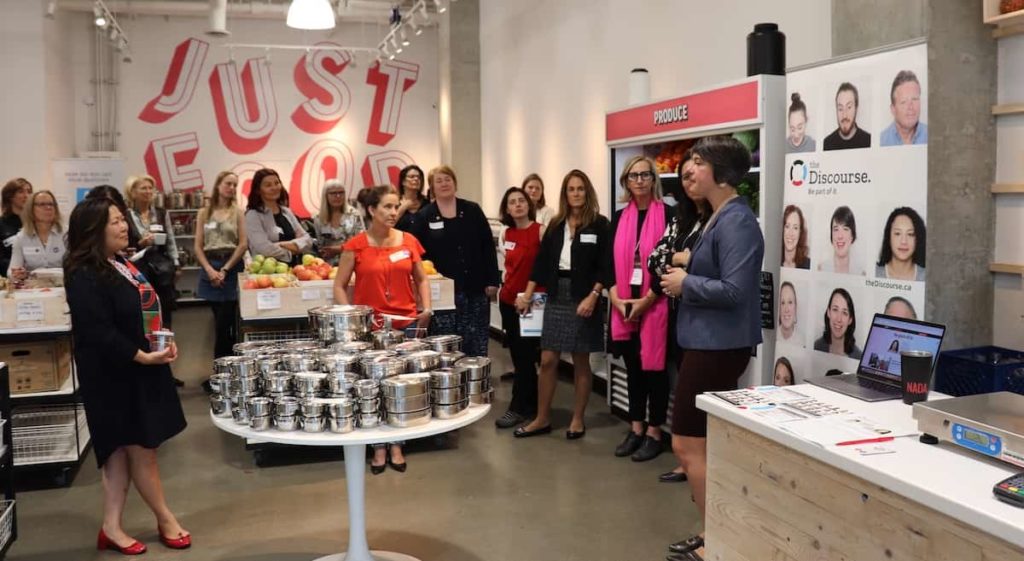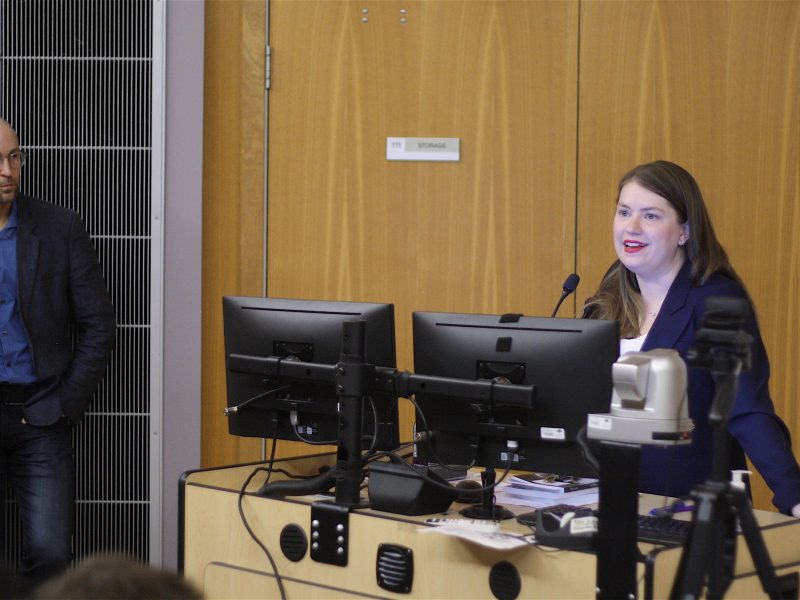
For newspapers, the un-bylined editorial is the ultimate expression of their power. Opinions voiced through these articles are negotiated by an editorial board, made up of people chosen for their experience and intellectual status. No specific author is credited because these editorials are intended to be the voice of the newspaper, the idea being to make bold statements that need to be heard by Canada.
I can imagine many responsible uses of such a powerful media tool in response to the release of the final report from the National Inquiry into Missing and Murdered Indigenous Women and Girls last week. Here are some suggested headlines:
- “Time is up for complacency toward violence against Canada’s most vulnerable”
- “Canadians should have zero tolerance for systemic racism at the RCMP”
- “Changing the criminal code to better protect Indigenous women will make Canada safer for everyone”
- “We, as journalists, need to do better as MMIWG shows media reinforced racist attitudes and ignored reports of missing Indigenous girls”
 Instead, Canada’s major newspapers’ instinct was to use their influence to defend our country’s powers that be from the report’s use of the word “genocide.” For example, The Globe and Mail’s first editorial on the report: “Is Canada committing genocide? That doesn’t add up.” The Toronto Starinitially called on the government to implement the report’s recommendations, then a few days later couldn’t resist jumping into the fray with “We need a new word. Genocide isn’t it,” thereby adding to the noise that was by then overtaking debate of the actual issues.
Instead, Canada’s major newspapers’ instinct was to use their influence to defend our country’s powers that be from the report’s use of the word “genocide.” For example, The Globe and Mail’s first editorial on the report: “Is Canada committing genocide? That doesn’t add up.” The Toronto Starinitially called on the government to implement the report’s recommendations, then a few days later couldn’t resist jumping into the fray with “We need a new word. Genocide isn’t it,” thereby adding to the noise that was by then overtaking debate of the actual issues.
In clicking on those headlines, one might reasonably expect a nuanced debate of the legal definition of the word “genocide,” the Inquiry’s rationale for using it, or implications to Canada of Trudeau’s acknowledgement. Using the word “genocide” has such complex legal considerations that the Inquiry published a 46-page supplementary report, A Legal Analysis of Genocide. Unfortunately, these editorials don’t contain much that suggests their authors read the supplementary report.
 In the Globe’s case, the editorial questions “is there evidence that the federal government is criminally complicit in those deaths?” Then, without answering that question, dismisses the use of the word “genocide” as “ridiculous” and “absurd.”
In the Globe’s case, the editorial questions “is there evidence that the federal government is criminally complicit in those deaths?” Then, without answering that question, dismisses the use of the word “genocide” as “ridiculous” and “absurd.”
Well, yes, the report’s hundreds of pages and thousands of testimonies together do make a case that the government is complicit in these deaths, which, as the report argues, are the result of many decades of policies that contributed to the victims’ vulnerability: residential schools, the Indian Act, inequity of services like clean drinking water and transportation, the destabilization of Indigenous families through the child-welfare system, systemic racism in our policing and criminal justice systems.
This is not a matter of Canada not moving “quickly enough to undo the harm its governments caused in the past,” as the Globe argues, but of our governments’ current failure to take action that could save Indigenous lives today. Indigenous women continue to be murdered at the same rate as when the Inquiry began. As The Discourse reported last week, child welfare policies create financial incentives to remove Indigenous children from their families. The same day that the Star published its genocide-denying editorial, in a jarring juxaposition, it also published a story about the UN criticizing the Canadian government for failing to explain  inaction on mercury poisoning in Grassy Narrows, where one study estimated 90 per cent of the population are affected. It’s no wonder that many Indigenous people consider that these actions, when taken all together, amount to an ongoing, targeted attack on their people.
inaction on mercury poisoning in Grassy Narrows, where one study estimated 90 per cent of the population are affected. It’s no wonder that many Indigenous people consider that these actions, when taken all together, amount to an ongoing, targeted attack on their people.
I’m not qualified to weigh in on the definition of “genocide,” and so instead of offering any further ill-informed opinions I suggest you read this piece in Maclean’s written by Osgoode Law assistant professor Heidi Matthews.
Instead, I’ll stick to something I know better: the impact of media coverage. In focusing the conversation about the report on its use of a word, media distracted from a proper examination of its recommendations. They damaged the credibility of the thousands of people who risked being retraumatized to have their story of suffering on the record for all Canadians to hear. They failed to represent Indigenous women’s perspectives, the very thing the report calls on media to avoid as it contributes “to the targeting of Indigenous women by silencing their experiences.” They provided cover for persistent racist attitudes and complacency among Canadians.
The MMIWG report was an opportunity for a substantive conversation about how to address one of the most important challenges facing our country. Instead, Canada’s leading news sources overshadowed stories of violence against women with debate over a word — demonstrating they are more interested in protecting non-Indigenous audiences from uncomfortable truths than using their power to protect our most vulnerable from violence and death.
#BePartOfIt
There’s less than a week left in our spring campaign, and we’re less than halfway to our goal of getting 1,000 supporters by June 15. Your contribution — whether that’s a monthly, annual or one-time commitment — will allow us to tell in-depth stories that amplify Indigenous perspectives. We don’t believe in putting our journalism behind a paywall, so if you find value community-powered stories, support us now.
How to listen
The final report from the Inquiry on Missing and Murdered Indigenous Women and Girls contains 231 Calls to Justice aimed at reforming justice, policing, health, child welfare and media systems. It also calls on all Canadians to make space to listen and learn about Indigenous history and the ongoing impacts of colonialism. “Create time and space for relationships based on respect as human beings, supporting and embracing differences with kindness, love, and respect,” the report asks.
- If you’re in Vancouver, don’t miss RavenSPEAK: Amplified. Seven Indigenous women will share compelling stories and vital messages that are too often silenced. Show up, listen and amplify these women’s voices.
- Read the book A Mind Spread Out on the Floor by Haudenosaunee writer Alicia Elliott for a critical meditation on trauma, legacy, oppression and racism.
- Reconcile your Twitter feed. Here are some super smart people to follow who informed this newsletter: @jessewente @rickharp @tearafraser @aylanX @WordsandGuitar @NehiyawRob @RMComedy @candiscallison
- Listen to and support mediaINDIGENA, hosted by Cree podcaster Rick Harp for sharp Indigenous analysis of current events.
SheEO venture tour at #WD2019

During the Women Deliver Conference in Vancouver, we stood alongside other local SheEO ventures and presented to federal Minister of Small Business Mary Ng. “When I’m here, it just reaffirms again that the power of female entrepreneurship,” said Ng. “There’s a way of doing business that’s empowering and as Vicky [Saunders] says, solves the words to do list.”
Let’s gather
- June 12 to 14: Director of communities Anita Li will moderate and speak on two panels about the future of media and higher education in a post-truth world, at the Worldviews Conference, hosted at the University of Toronto.
- June 14: Data reporter Francesca Fionda and former sustainability reporter Alia Dharssi will present The Discourse’s refugee toolkits, which train refugees on how to speak with journalists, and advise the media on how they can improve their coverage of refugees, at an event organized by the BC Refugee Hub and other groups.
- June 16: Director of communities Anita Li will present a keynote address on the changing media landscape at Evolving Expectations, the Canadian Public Relations Society’s national conference in Edmonton.
Shout-outs
In last week’s newsletter, director of communities Anita Li shared The Discourse’s journey towards better diversity and inclusion, naming specific things that happened to her at the company, as well as the steps we’re taking to improve our culture and genuinely institutionalize D&I.
Thanks to our community members who shared their thoughts:
“Good important work. Keep D&I at the forefront of your work, your entire career. It’s an affront to humanity when ‘voices’ go unheard. We cheat ourselves.”
– Michael Smith, Scarborough Discourse supporter
“So much respect to you and your colleagues for being so honest. Will take some of the recommendations in your post!”
– Joanna Chiu, bureau chief for Star Vancouver
“I had the pleasure of being paired up with Anita Li at the Solutions Journalism Network conference last year and was so impressed with how genuinely she spoke about diversity and inclusion. Some people are well-intentioned, but she is actually doing the work of figuring out how to make a measurable difference. Subscribe and support their cause, while learning what you could be doing along the way.”
– Katherine Ellis, content strategist, NewsWhip
Diversity commitments
Anita asked members of our staff to make D&I commitments at work, and here’s what they pledged:
“I commit to keep reading, listening and watching media about whiteness and decolonization, so I can deepen my understanding of what it means to be an ally.”
– Brielle Morgan, Urban Nation reporter
“I will work towards institutionalizing diversity and inclusion at The Discourse by including my pronouns when I introduce myself over the phone and in person.”
– Francesca Fionda, data reporter
“I will work harder to reflect the many marginalized communities in Scarborough. (Need to do a better job of making Indigenous connections, especially.)”
– Aparita Bhandari, Scarborough reporter
“I commit to doing the work to build trust with Indigenous communities of the Cowichan Valley, who have been excluded and harmed by media representation in the past.”
– Jacqueline Ronson, Cowichan Valley reporter
“I commit to staying quiet and listening more to create space for my colleagues and community members to share their expertise, encouraging our team to report back on our progress so we can hold ourselves accountable, and asking myself, ‘How could I have approached that differently?’”
– Lauren Kaljur, Cowichan Valley producer
“I will work towards institutionalizing diversity and inclusion at The Discourse by prioritizing this at all levels of what we do. From management, to partnership, to editorial, to moderating, to speaking engagements and beyond, I will ensure that I — and we as a team — are seeking, listening to, and centring diverse perspectives so that we can live up to our mandate to create a more equitable world.”
– Lindsay Sample, managing editor
Tell us: How are you promoting diversity and inclusion at your workplace? [end]



